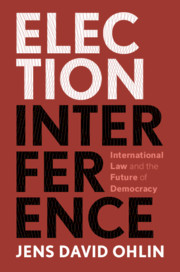Book contents
- Election Interference
- Election Interference
- Copyright page
- Dedication
- Contents
- Acknowledgements
- Introduction
- 1 What Is Election Interference?
- 2 Election Interference Is Not Cyber-War
- 3 Limits of the Sovereignty Framework
- 4 The Promise of Self-Determination
- 5 Foreign Electioneering and Transparency
- 6 Free Speech and Elections
- 7 The Value of Criminal Prosecutions
- 8 Soliciting Foreign Interference
- Conclusion
- Index
8 - Soliciting Foreign Interference
Published online by Cambridge University Press: 09 June 2020
- Election Interference
- Election Interference
- Copyright page
- Dedication
- Contents
- Acknowledgements
- Introduction
- 1 What Is Election Interference?
- 2 Election Interference Is Not Cyber-War
- 3 Limits of the Sovereignty Framework
- 4 The Promise of Self-Determination
- 5 Foreign Electioneering and Transparency
- 6 Free Speech and Elections
- 7 The Value of Criminal Prosecutions
- 8 Soliciting Foreign Interference
- Conclusion
- Index
Summary
Solicitation of foreign interference in an election represents a betrayal of public trust because it threatens to undermine the people’s right of self-determination – a foundational norm of our constitutional order. Section 1 of the chapter focuses on candidate Trump’s solicitation of Russian email hacking during his speech in Florida in July of 2016 – a speech that set the tone for much of what was to come during the Trump presidency. Likewise, Section 2 focuses on an even more daring solicitation: President Trump’s solicitation of interference from Ukraine during a call with its President, Volodymyr Zelensky. Section 3 looks at the legal status of the domestic norm against soliciting foreign interference. This chapter argues that, for the removal of all doubt, Congress should pass a new statute criminalizing the solicitation of foreign involvement in elections. Section 4 responds to the argument that such a statute could not be applied against the President because doing so would conflict with the President’s constitutional authority to conduct foreign relations. Finally, Section 5 examines the ultimate remedy of impeachment as a tool for sanctioning a President who solicits foreign involvement in an election.
Keywords
- Type
- Chapter
- Information
- Election InterferenceInternational Law and the Future of Democracy, pp. 191 - 213Publisher: Cambridge University PressPrint publication year: 2020



